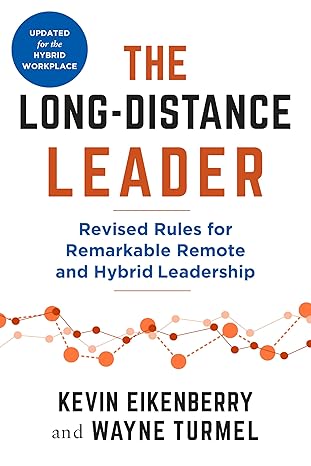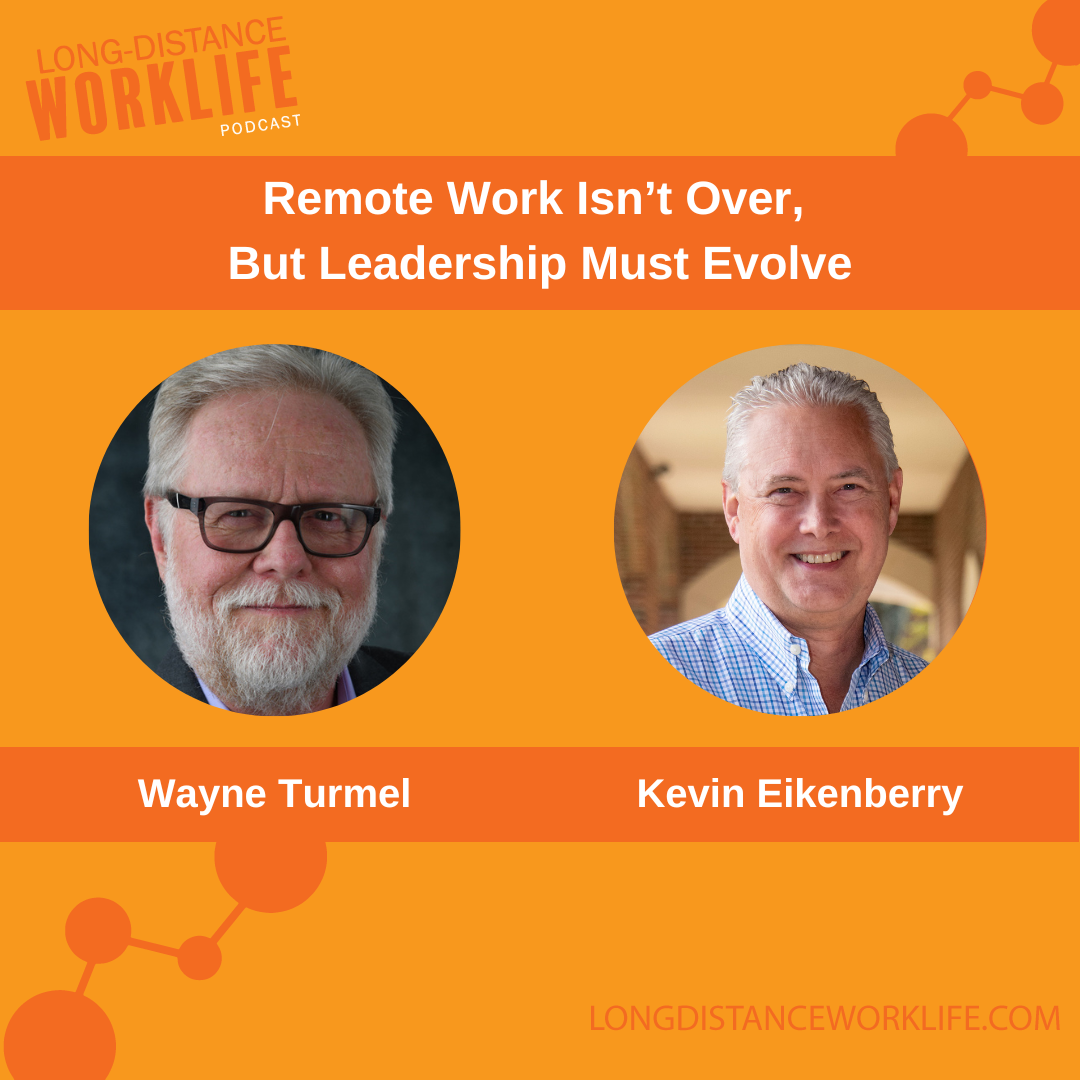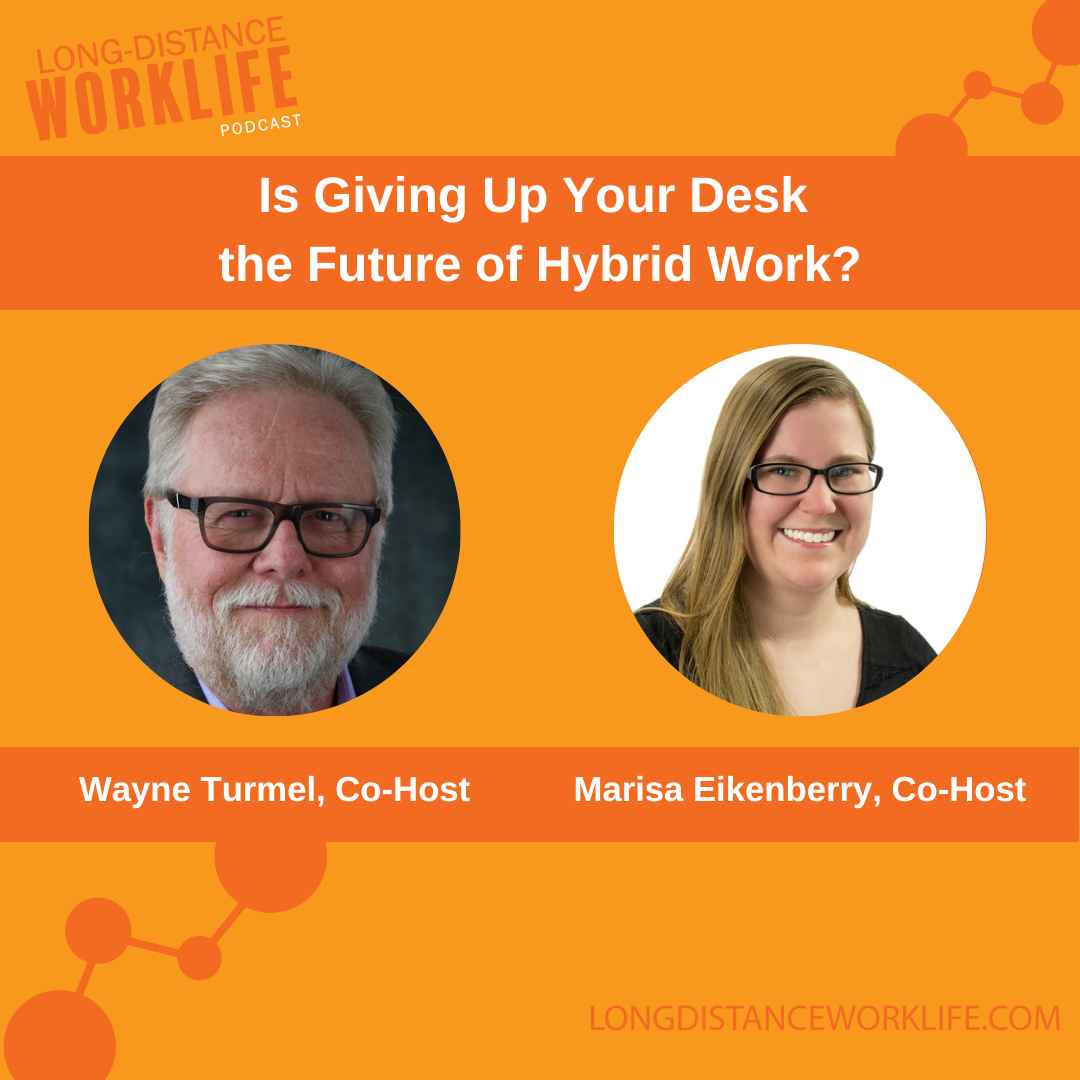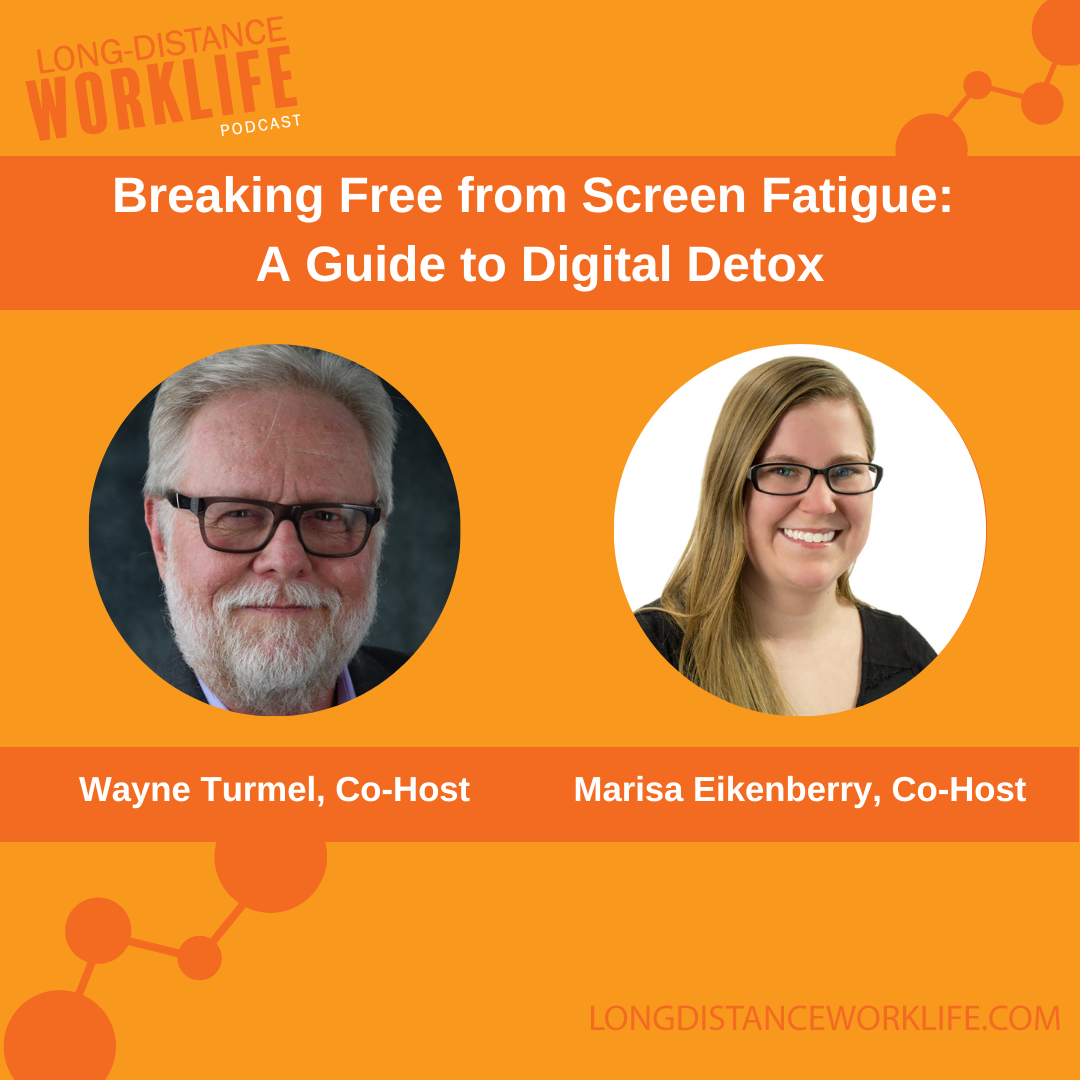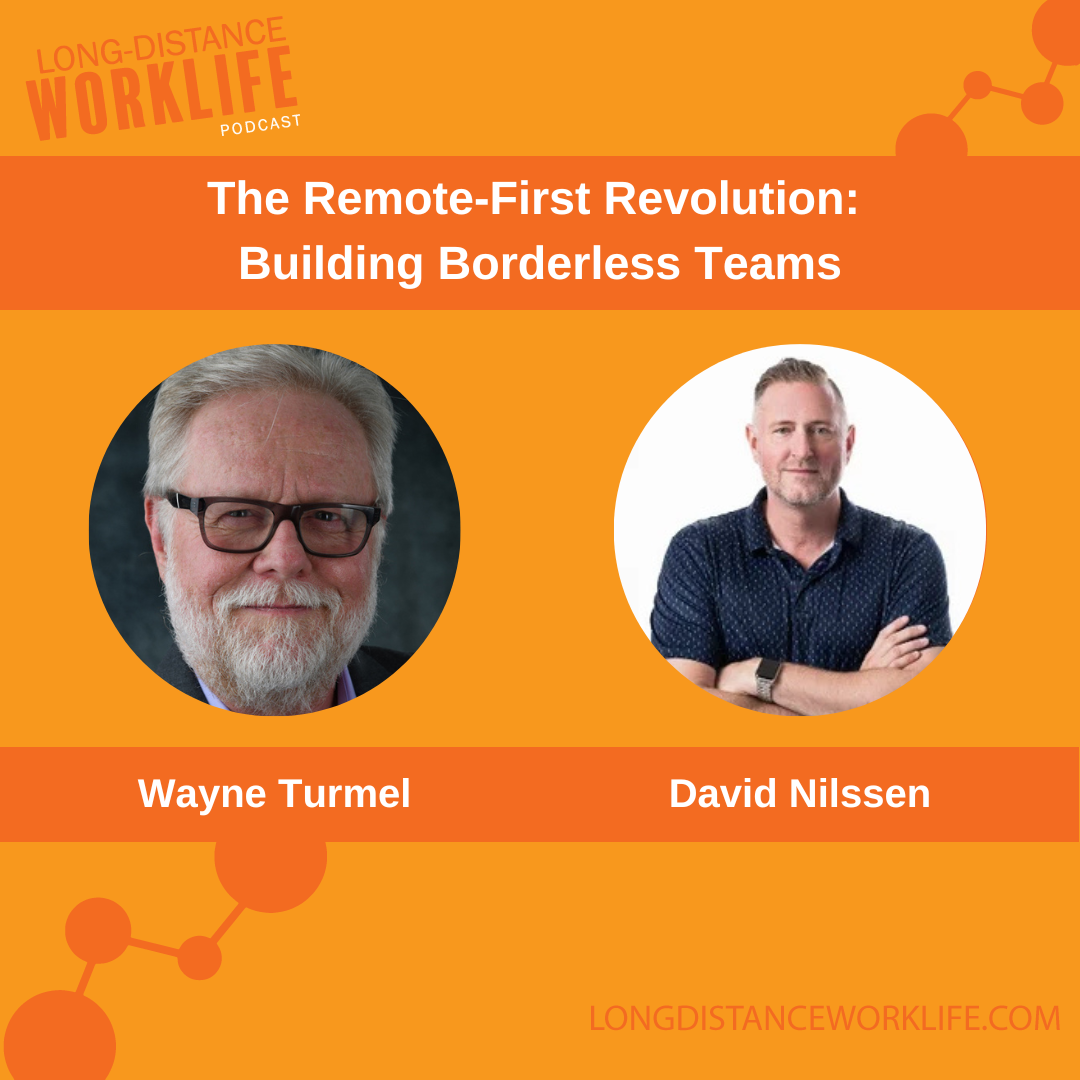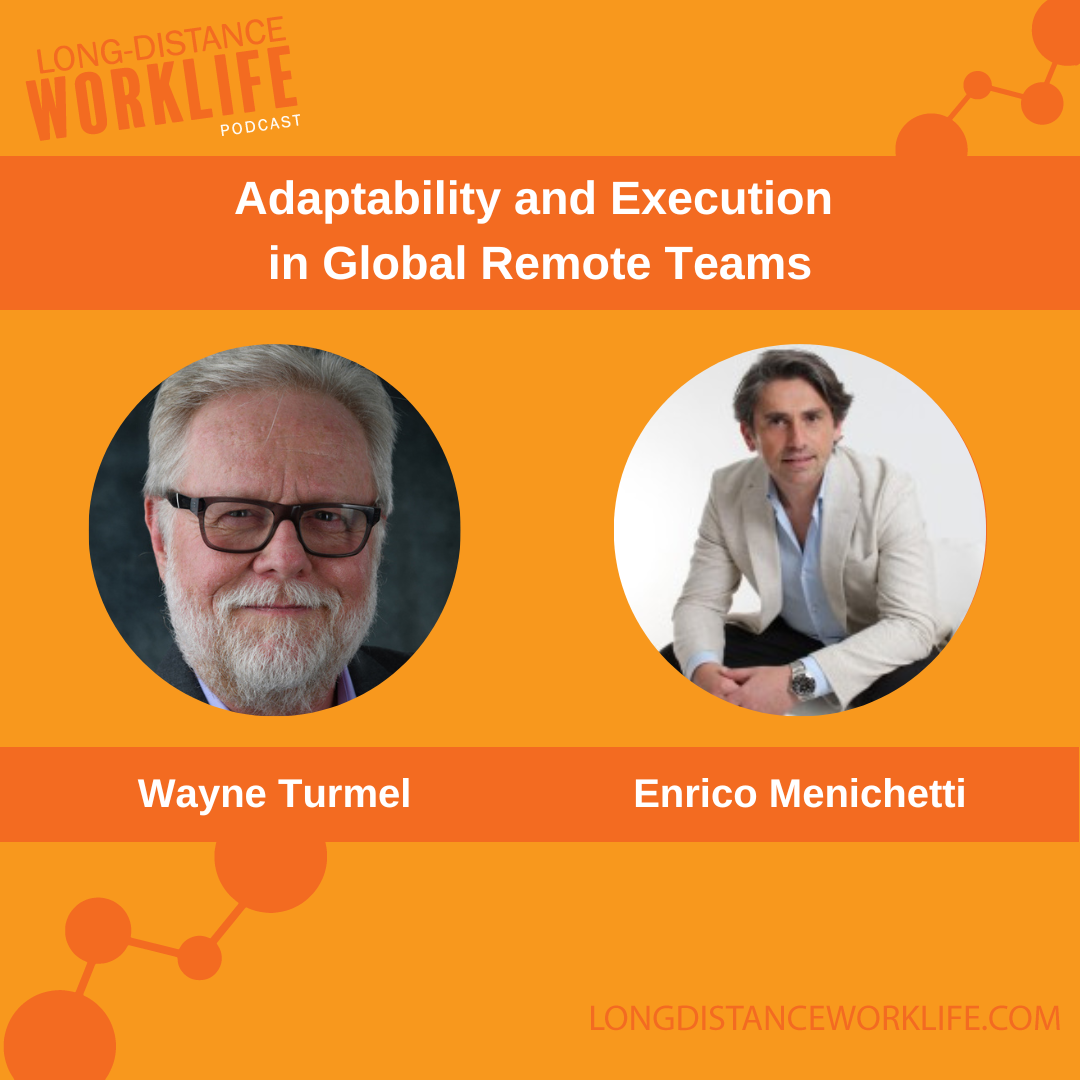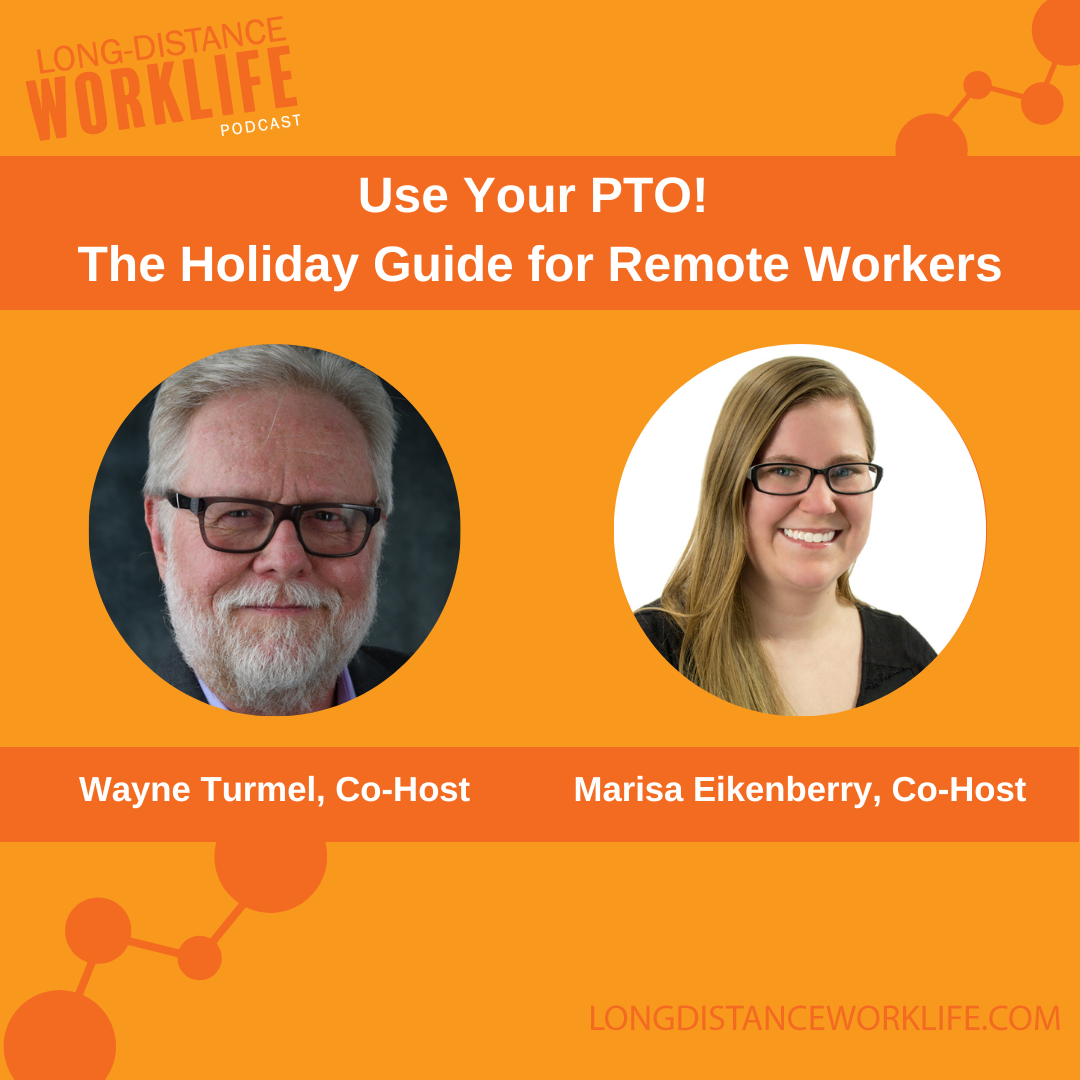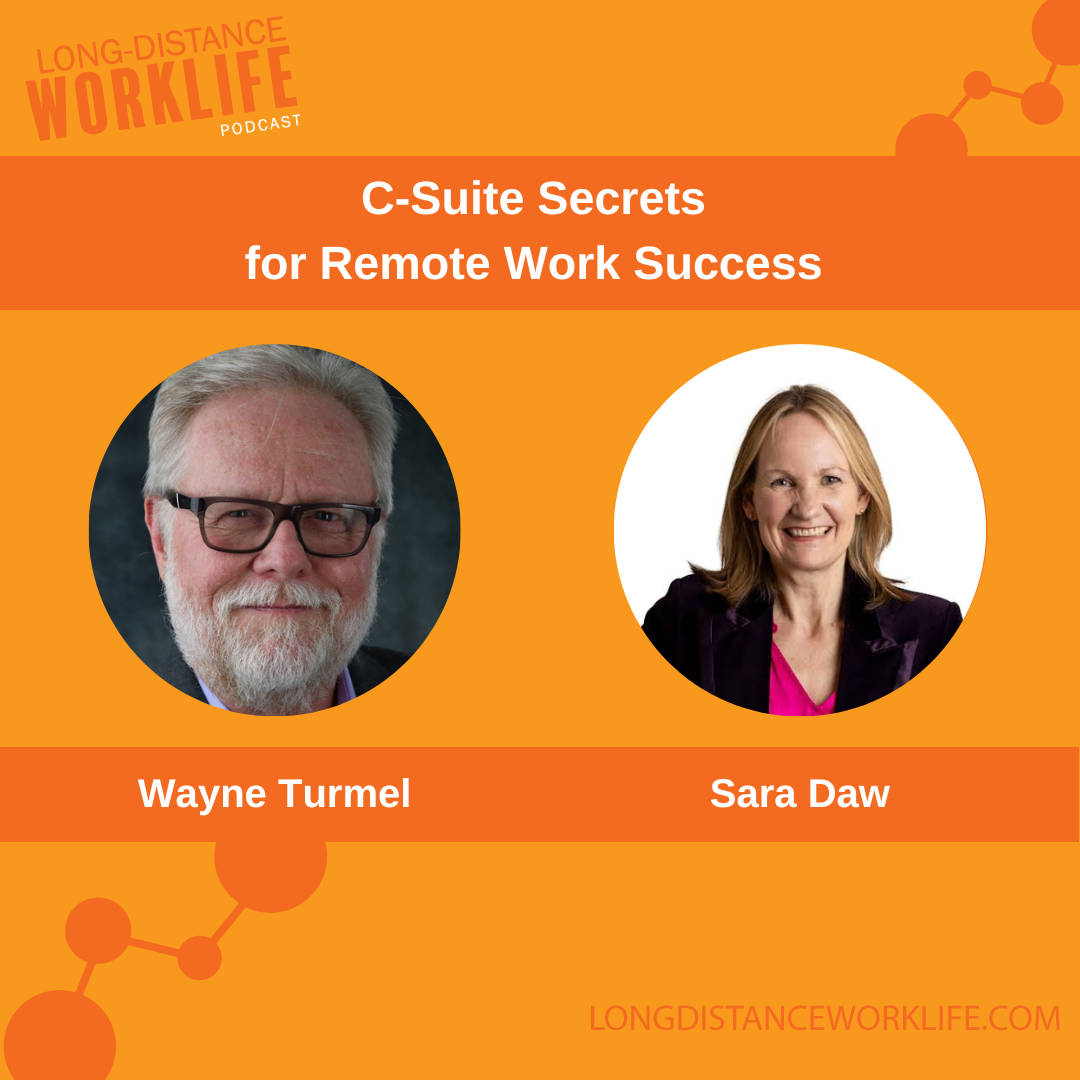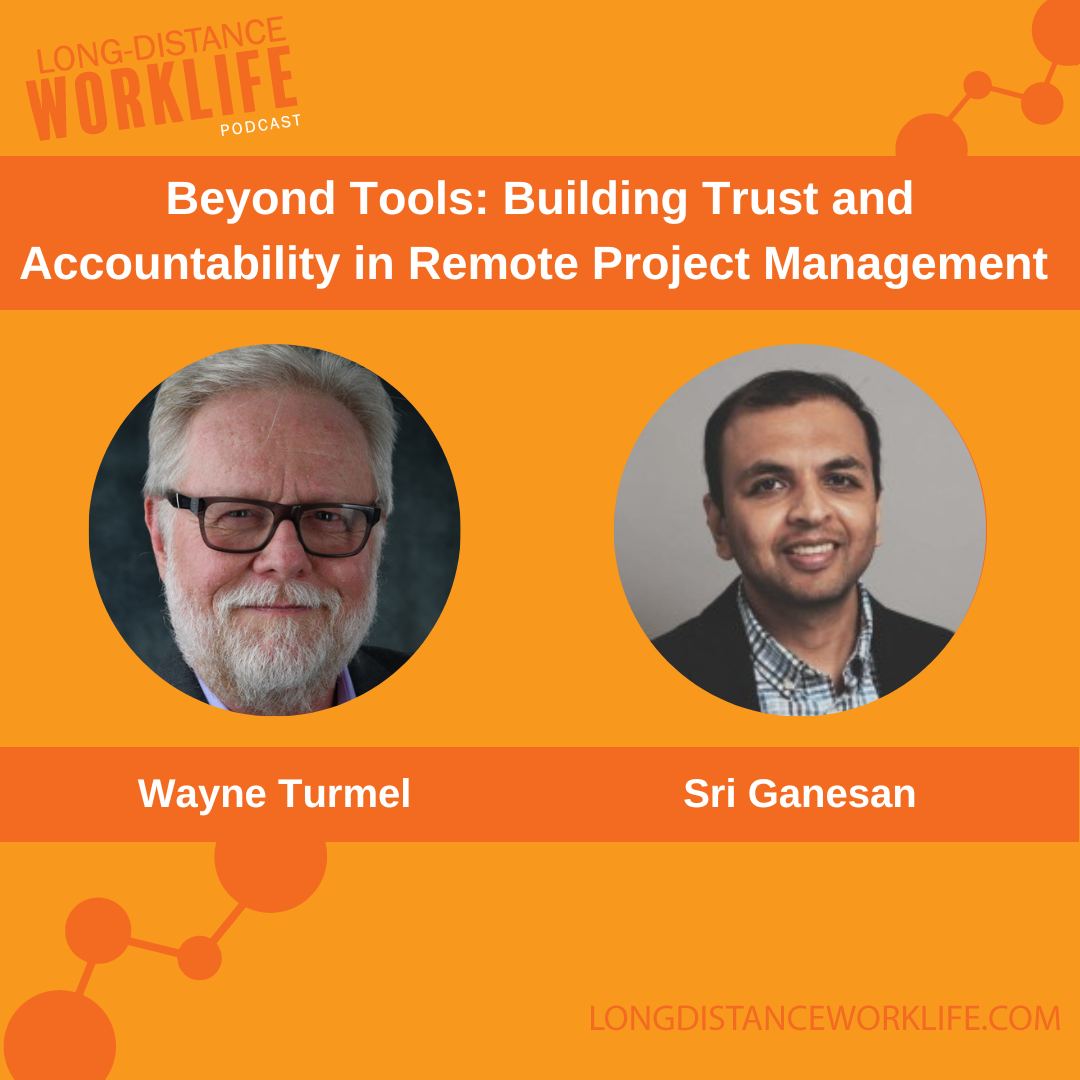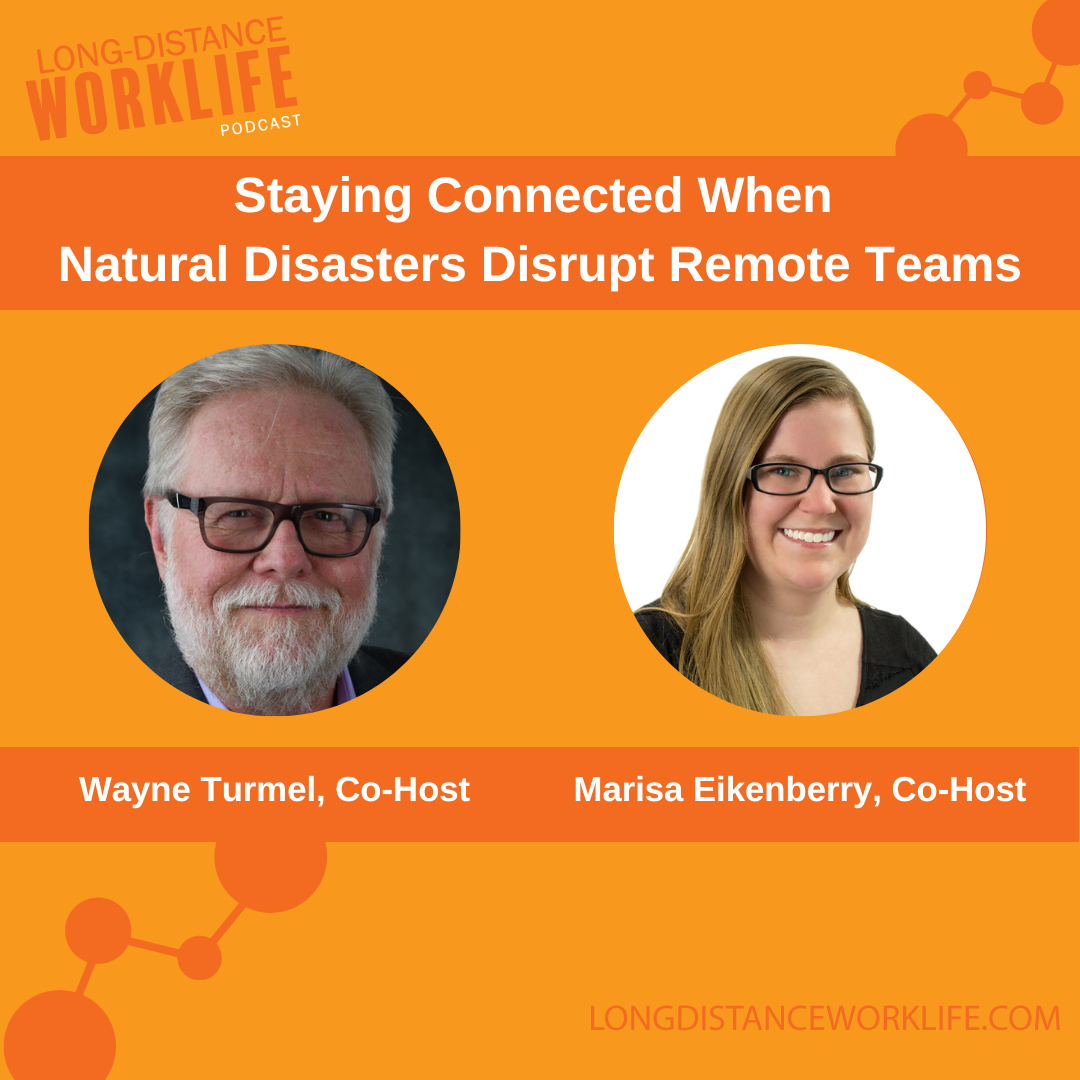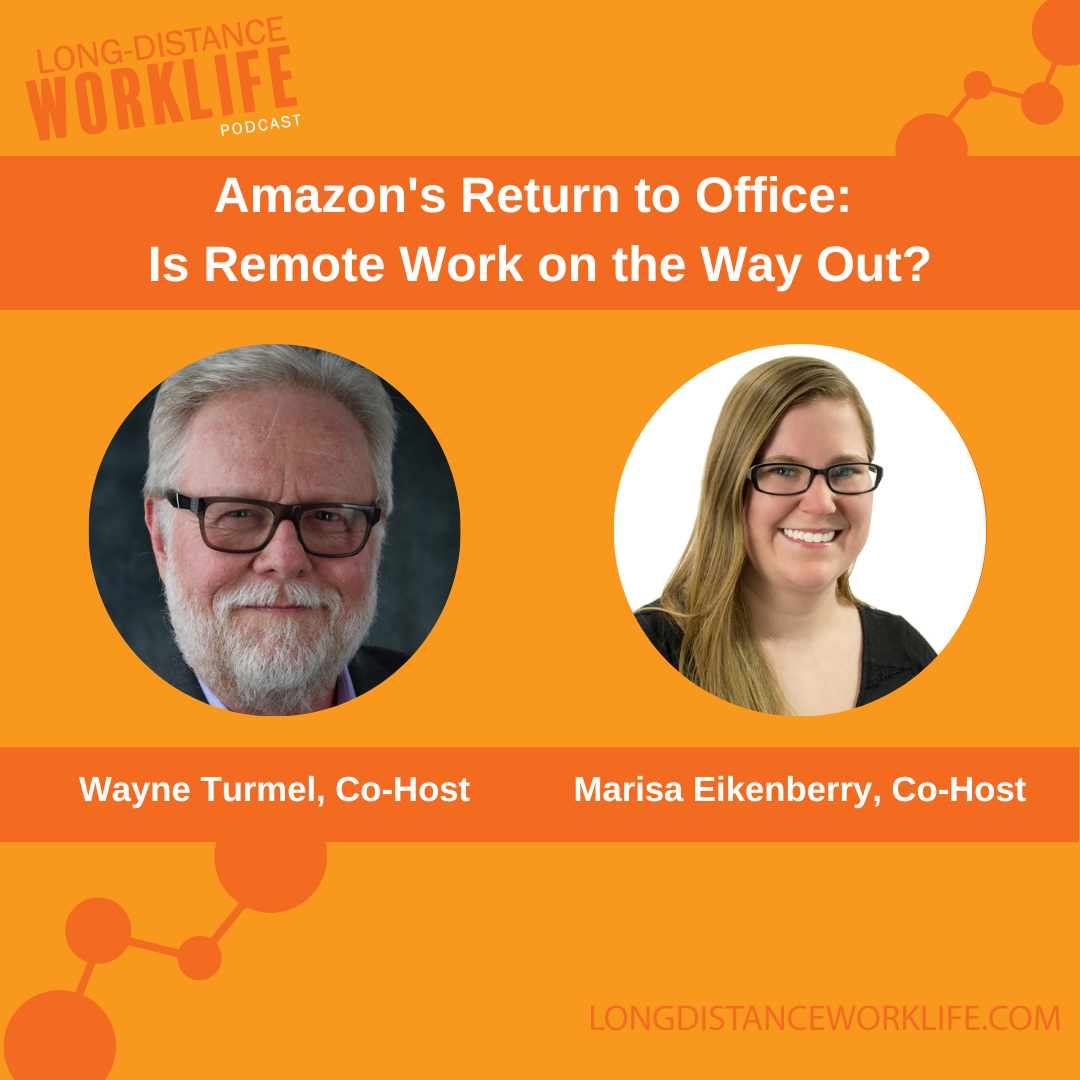Wayne Turmel is joined by leadership expert Kevin Eikenberry to discuss the future of leadership, workplace flexibility, and the key insights from Kevin’s latest book, Flexible Leadership: Navigate Uncertainty and Lead with Confidence.
They explore why leadership must evolve in response to an ever-changing work environment, how leaders can balance flexibility with consistency, and why the debate around remote and hybrid work is far from over. Plus, Wayne shares an important announcement about the future of the podcast.
Don’t miss this insightful conversation on navigating the complexities of leadership in 2025 and beyond.
Key Takeaways
1. Why flexible leadership is essential in today’s workplace
2. The myths around “return to office” and why remote work isn’t dead
3. How leaders can balance consistency and adaptability
4. Practical strategies for leading teams in uncertain times
5. A major announcement about Long-Distance Worklife and what’s next
00;00;08;03 - 00;00;35;09
Wayne Turmel
Hi, everybody. Welcome to another episode of Long Distance Worklife, the show where we need to help you. Do more than survive, but thrive in the crazy, evolving world of work. Our guest today, because it is a Marisa-less episode, but our guest today is somebody very familiar to most of you. You have heard his name, if not actually met him.
00;00;35;16 - 00;00;59;20
Wayne Turmel
That is, our boss and my coauthor, author, Kevin Eikenberry. And when the interview is over, I would really love you to stick around. I have an important announcement to make at the end of the show that I hope you will stick around for and heed. That being said, we are going to introduce the lovely and talented Kevin Eikenberry.
00;00;59;25 - 00;01;26;12
Wayne Turmel
He is the brains behind the Kevin Eikenberry group. He is also my coauthor on the three books in the Long Distance Work Life series, Long Distance Leader, Long Distance Teammate, Long Distance Team, and now Circling Back Again, with the updated version of long distance leader. But he's not here to talk about any of that stuff. He is here to talk about his latest book, Flexible Leadership.
00;01;26;12 - 00;01;27;29
Wayne Turmel
Kevin, how are you?
00;01;28;01 - 00;01;34;19
Kevin Eikenberry
Hey. I'm good, I'm good. I'm glad to be here. It's nice man. This side of the mic.
00;01;34;22 - 00;01;55;29
Wayne Turmel
Yeah it is. You do as much of this or more than I do. And it's, It's sometimes tiring, but I know you are energized because you've got a new book that you're very excited about. Let's start with the title flexible Leadership. I mean, isn't that the idea? What? What is the central idea?
00;01;56;01 - 00;02;17;22
Kevin Eikenberry
Yeah, that's pretty close to the central idea. You know, I think that, most of us would say, well, if the world has changed, which obviously you've talked about a lot in this show, then shouldn't we have to change as a leader, too? And I would say the answer is yes. And yet, for the most part, most leaders are locked into the way they've always done it to what they think their style is, to what they think they're supposed to do.
00;02;17;25 - 00;02;41;19
Kevin Eikenberry
Trends or habits are. And my assertion is that, there's not there's not a right way to lead. There's but in every situation, there's there's probably a best way or a small number of best ways that we could lead in that moment. And, we need to figure out how to understand what those moments look like and how to lead in the best way, not necessarily in our most comfortable way.
00;02;41;21 - 00;03;03;28
Wayne Turmel
Well, and that gets us to kind of an important point, which is there's this notion that, you know, returning to the office or, remote work is kind of behind us, and we've done it. And we've kind of moved on from that. First of all, I mean, what do you say to that?
00;03;04;01 - 00;03;24;00
Kevin Eikenberry
Well, I think that, what we've got is a pendulum. Right? And we had we had a we had a pandemic and the pendulum went all the way to the law, said you had to stay home from work, from the office, to maybe we could make this work to maybe we really think we ought to go back to the way it used to be.
00;03;24;02 - 00;03;49;17
Kevin Eikenberry
But, you know, I remember you and I saying very early in the pandemic, and I think you probably actually said at first that the cat's out of the bag, that, you know, you're never going to you're never going to put that back in. You were never going to go all the way back to where we were before. And even though now, as we have this conversation in January of 2025, where it seems like an awful lot of big organizations are saying you all need to come on back to the office.
00;03;49;19 - 00;03;59;12
Kevin Eikenberry
I don't think we'll ever go all the way back to where we once were. I don't think that's possible. I don't think it's likely. And I don't even think it's necessary.
00;03;59;14 - 00;04;37;26
Wayne Turmel
Well, and it does fall on leaders to navigate their way through this. I mean, you and I saw a report this morning that said, while 80% of companies have back to the office orders, only 17% of them are actually enforcing the rules. Or what's even kind of worse is we've reverted to the stealth remote work that we had in the before times where, well, somebody kid is sick, so we'll let her work from home and, you know, somebody else just, you know, he gets stuff done.
00;04;37;26 - 00;04;45;07
Wayne Turmel
So we'll just let him slide and let it go. And that lack of structure can put a lot of pressure on, on and on.
00;04;45;07 - 00;05;10;25
Kevin Eikenberry
Leader puts a lot of pressure on a leader puts a lot of pressure on individuals. Right. Am I am I in the in-group that gets to stay home? Am I not like, how does that all play? There's a whole lot of stuff I think there, you know, to me, the whole this whole pendulum swing. I was mentioning Wayne and of course you and I have talked about this, but to me, in In Long Distance Leader, we talk about, the three oh model and that leadership is about outcomes, others and ourselves.
00;05;10;25 - 00;05;33;17
Kevin Eikenberry
And I think so much of all of the tumult, so much of the conversation about what return to office looks like and where, where it's happening and what's going to happen with it has really been a tension between outcomes and others. Right? So those who have said we need to come back to the office have said we need that so we can get the outcomes that we need.
00;05;33;19 - 00;05;58;07
Kevin Eikenberry
And it was like we're fighting against in some ways against others, the team who in many cases would rather stay home and and it's been framed as there's going to be a winner and a loser. The you know, and maybe outputs are winning because we're going to have to come back or, or, or when we weren't bringing people back, it's like, well, we had to give in to others so that they so we wouldn't lose them.
00;05;58;14 - 00;06;25;25
Kevin Eikenberry
And so it's been framed too often as an as an either or choice, and it's been framed as a tension between those two things. And and, and in the new book, I would call that a flexor, the idea of a flexor and, and the right answer, in this case, to this conversation we're having here, is that, like with any of the flexors that we could talk about, that the right answer is rarely at either end, but it's somewhere in the middle.
00;06;25;28 - 00;06;46;15
Kevin Eikenberry
Right. And so that's why I don't think we'll ever go all the way back, because we, we have the cat is out of that bag. Right. You can't put the genie back in that bottle or whatever, whatever you want to say. And and the reality is that even though people might feel that tension, that the leaders that are most effective, the leaders that are flexible will say, what's the context?
00;06;46;15 - 00;07;01;24
Kevin Eikenberry
Say, and where should we be leaning between those two rather than we're going all the way back or we're never going back? And I've never really been a proponent of either end of that spectrum. But the right answer is somewhere in the middle, and different answer for different organizations and different teams, different work.
00;07;01;27 - 00;07;25;20
Wayne Turmel
Yeah. Let's talk about because you mentioned the three oh model and all of our work in the long distance, work life series contains models that that are helpful. And we didn't invent all of those models in long distance leader. One of the most important things I think we did was raise the notion of richness versus scope, which was research that came before you and I.
00;07;25;22 - 00;07;50;06
Wayne Turmel
But we extrapolated what that meant for certain circumstances. And you've done the same thing with something called the Orphan Model, which is a really interesting starting point. And then we'll talk about what you've added to and extrapolate it on to that. But first of all, tell us what that first model is, because first of all, it's in Welsh.
00;07;50;13 - 00;07;55;10
Wayne Turmel
And Welsh may as well be Greek. And there's too many consonants. And help me out.
00;07;55;12 - 00;08;12;08
Kevin Eikenberry
Listen, you're the first. This is the first show I've been on. Where were the host said it. Right. Can Evan, Which is a which is a model that was built, by Dave Snowdon and others. I want to certainly give him full credit. And it's been it's really meant as a model to help us make sense of the world.
00;08;12;11 - 00;08;31;04
Kevin Eikenberry
So, if, if I put you someplace in on the planet and tell you to leave, but if you don't have a map for leaving, you don't know where to go, and you're stuck. And so, as leaders, we find ourselves in a world, and sometimes we don't really know how to make sense of it because, you know, so we end up treating everything the same.
00;08;31;06 - 00;08;46;12
Kevin Eikenberry
So the can have been model says there's sort of four sort of domains in which, a situation falls and they, they all start with the letter C. And Wayne would laugh that Kevin likes alliteration. But this is not my model, Wayne. Just saying. So the for.
00;08;46;12 - 00;08;48;15
Wayne Turmel
Know we know why it appeals to you.
00;08;48;22 - 00;09;09;12
Kevin Eikenberry
Pedro. Well, it's not the only reason. It's just an added bonus. As it turns out. Wayne. So the Kevin model says that situations that we find ourselves in are either clear. The context is either clear, it's complicated, it's complex, or it's chaotic. And it relates to, how much we know about or what we know about in the situation.
00;09;09;12 - 00;09;36;07
Kevin Eikenberry
And from that, according to the great work of Snowden and others, is to say, well, given that context, what should we then what is the best next step for us to take? And the the problem is that as leaders, we have typically been trained to lead in situate contexts that are clear. We know the information. There's an answer.
00;09;36;07 - 00;09;56;18
Kevin Eikenberry
We pick the answer. We've got best practices. I mean, listen, I worked in an organization before I started this company at Chevron. Well run. Well respected, good company that in that time period over 30 years ago, the big focus was best practices. And if the world is clear or relatively clear and there are things we can figure out, then best practices that are a great way to go.
00;09;56;19 - 00;10;13;17
Kevin Eikenberry
When the context is clear, that's great. Also, in the context is clear, it's really easy for leaders to say, I have the answer. Let's go, everyone follow me and let's go. But that's not the world we live in most of the time. And yet that's the that's the that's the place where we end up spending, where we think our time is.
00;10;13;17 - 00;10;15;18
Kevin Eikenberry
That's what leaders are doing.
00;10;15;21 - 00;10;47;04
Wayne Turmel
Well. And of course, that leads to the idea of flexibility, right? The ability to lead when there is a distinct roadmap is very different. When you know it's March 17th of 2020 and the world blows up and we don't know what the heck we're doing, right. And so what you've done is you've taken the Canavan model and you have added these things called flexors, and these are designed to help a leader say, okay, this situation is really chaotic.
00;10;47;09 - 00;11;00;09
Wayne Turmel
Here are the things I need to think about versus there's a you know, the roadmap is clear. So help us through the flexors and what does that mean. Yeah. So let's just.
00;11;00;09 - 00;11;20;15
Kevin Eikenberry
Take an example one. Right. So so yeah so the idea of flexors are so it's easy to say well make makes understand what the situation is. And then lead accordingly. Except that that's not very helpful really yet. And so let's take an example. So for years when I've asked leaders in groups I said would you listen.
00;11;20;15 - 00;11;39;29
Kevin Eikenberry
Would you rather lead for compliance or commitment? And nearly every leader or reason that want to lead for commitment, I want my team to be committed and all that stuff. So there's a flexor compliance and commitment, right? Okay. So, I'd rather have my team be committed. That sounds awesome. And yet, what do most of us find we've experienced?
00;11;40;01 - 00;12;04;28
Kevin Eikenberry
What do most? In fact, I can ask those same leaders next. Where does your leader lead you? Do they lead you to being committed and engaged, or do they lead you to at like just yes, boss. Right. Straight up mere compliance is yes sir. Yes, ma'am. Yes, boss. Whatever you say, boss. And for the most part, we don't think that seems like that's what we want.
00;12;04;28 - 00;12;26;08
Kevin Eikenberry
We'd really have people rather be committed, right? Okay, cool. So does that mean that we should forget about compliance and just focus on commitment? I would say no. Listen, if the if the world if the moment is truly chaotic and no one knows what's going, let's take March 17th, 2020, right? What everybody needed was for the boss to say, we got to do something, what are we going to do?
00;12;26;08 - 00;12;50;16
Kevin Eikenberry
And in that moment, they people were ready to comply. Like there's nothing wrong with compliance in the right context in that moment. Like, okay, that's what we're going to do. We're going to send we're going to do this and we're going to get computers to everybody. And here's what's going to happen, okay. But staying there and continuing to lead or act in that place of chaos and stay in command and control.
00;12;50;19 - 00;13;16;21
Kevin Eikenberry
Some people found that didn't work very long, just like they found in other situations. It doesn't work very well. Right? So maybe, in the 1940s or 1950s, when most everything was pretty well clear and things were an all of the knowns were known, then people were more okay with sort of following what the boss said. And yet now that's not the way the world looks.
00;13;16;24 - 00;13;49;19
Kevin Eikenberry
It's not the way the world acts. There's more uncertainty. It's more complicated and complex. Which means that while back to the lecture itself, the right answer is seldom solely compliance or solely commitment. But somewhere in between now, I would say, and we talk about in the book, that in a in a world that's more complex or complicated, we're probably going to lean more toward the, the commitment side makes a great deal of sense.
00;13;49;22 - 00;14;10;13
Kevin Eikenberry
But, you know, sometimes people don't need to be committed. They just need to know where we're going. And that's why. And that's the example of it could be directionally either way. And that's okay. Right. People were fine with saying, hey, we're going to continue to do this. But now notice how many people haven't felt so good about the boss bosses of the world.
00;14;10;13 - 00;14;26;12
Kevin Eikenberry
Simply people like us simply saying we're going to bring you all back like that hasn't worked so well, because compliance alone isn't necessarily the best approach in this complex and complicated world we're in now. Yeah, so.
00;14;26;14 - 00;14;45;29
Wayne Turmel
We've got to be flexible and how does that match up with being consistent and and, you know, accountable? I mean it sounds on the surface like there's a paradox there.
00;14;46;01 - 00;15;09;19
Kevin Eikenberry
Oh I think there definitely is a paradox there. Right. And and so we could put consistent and flexible as a flex or two. So here's the example that I use in the book. And it's I think the best one I've come up with to date. And that is look at a tree, you know, a tree that's, you know, ten, 15, 20 years old and you would likely look at that tree and say, that tree's stable.
00;15;09;19 - 00;15;37;09
Kevin Eikenberry
That's tree's consistent. That tree's got longevity. That tree's solid. And it is it's deeply rooted. And it's the roots that keep it solid. And yet a tree that doesn't isn't able to flex if its branches aren't able to flex, not going to last very long. And so the tree is both consistent, stable, sturdy and flexible. It's both of those things.
00;15;37;09 - 00;15;55;12
Kevin Eikenberry
So in all of these cases we think about a paradox we need to stop thinking about, well, which one is it. But how much of each one is it. Right. So if we go back to the tree, it's stable because it's rooted. So if we go back to say, do we want leaders to be consistent or do we want leaders to be flexible?
00;15;55;15 - 00;16;21;04
Kevin Eikenberry
I would say the answer, like a tree is yes, both we a tree is stable and consistent because of its roots. A leader needs to be consistent in their roots, which is their values, their principles, the kinds of principles you've been talking about on the show, in their in their mission, of their organization, in morality and ethics.
00;16;21;04 - 00;16;39;17
Kevin Eikenberry
Like, those are the things that we must be consistent on, but we must be flexible as we've been talking about in the last 20 minutes or so on approach. So the the what and the why are consistent. The how is flexible.
00;16;39;19 - 00;17;07;04
Wayne Turmel
Yeah. That idea of the how being where the flexibility comes in, I think is really important. Talk to me about some communication challenges and then the strategies to deal with that. How is communication different in a flexible leaders approach than in one who is more firmly rooted?
00;17;07;07 - 00;17;29;16
Kevin Eikenberry
I think I think the first thing is, you know, as you decide that, that you have the intention of wanting to be flexible in approach, then you need that needs to be one of the things that your organization and your team knows that they understand. Hey, we know what we can expect of Kevin, and one of the things we're going to expect of Kevin is that he's going to adapt based on the situation as needed.
00;17;29;18 - 00;17;47;19
Kevin Eikenberry
And I'd like to hope, our team would say that about me. But I think the first part about communicating about it is for people. We have to be clear about our intention around it, and then we can share that with others. Just like you've talked for years about having clear expectations about how we communicate and when we communicate.
00;17;47;21 - 00;18;08;25
Kevin Eikenberry
This is just another example that is about the expectations of how we're going to interact. Relate to this, the idea that we may have to be flexible and and you know what that may mean that I'm going to need to respond in this situation in a way that's not my natural or first inclination. And I think that that ends up being super healthy.
00;18;08;25 - 00;18;19;12
Kevin Eikenberry
But, but we have to, as you said, have to get people to understand, this this this is how we lead.
00;18;19;14 - 00;18;41;09
Wayne Turmel
I'm going to put you on the spot a little bit, and I understand working with me will turn almost anybody into Gumby. And standing requires some flexibility and some patience. But aside from dealing with Wayne, which, you know, I don't wish on anybody, but what have you found?
00;18;41;11 - 00;18;43;01
Kevin Eikenberry
I took it unwillingly, Wayne.
00;18;43;03 - 00;19;02;28
Wayne Turmel
Well, I understand that, but what have you found in the last little while is a flexor that you've really had to exercise? Maybe something that you've had to be more flexible with than you ever thought that you might.
00;19;03;00 - 00;19;34;05
Kevin Eikenberry
I think that I've had to be, I have to be. I have to really work at, one that is, I am, I am sometimes I sometimes need to be firmer, with folks than I think I sometimes am. I will lean toward letting people make their call, helping them, helping them decide what they want to do when sometimes I need to be a little clearer about, hey, this is what we need to do.
00;19;34;05 - 00;19;55;03
Kevin Eikenberry
This is where we're going to focus. And so I've had to work on, you know, at any time there's a situation that you're facing that you realize a better approach might not be your natural inclination. Those are all the times when you're going to have to. You're going to have to work at the flexing a bit more, right?
00;19;55;06 - 00;20;19;14
Kevin Eikenberry
Otherwise, if we just go to our first natural instinct, then we won't necessarily get, we won't flex. We'll just keep doing what we've always done. We'll keep doing what the assessment we took says we are, because that's the kind of leader that I am. Right. So it whenever, whenever we're forced by the situation or the context to adjust if we want better results.
00;20;19;14 - 00;20;24;23
Kevin Eikenberry
Those are the those are the times. And that's a, that's an example. The first one that comes to my mind.
00;20;24;25 - 00;20;50;13
Wayne Turmel
I think it's a perfectly good one in knowing you as I do, I think that's probably the correct one. We're going to wrap it up on this, you know, it's funny, in our business, we teach leadership and we teach organizations around the world. And for a while, everything was in-person workshops. And we were very focused on kind of new leaders, supervisors.
00;20;50;17 - 00;21;20;25
Wayne Turmel
And then all of a sudden it was remote. And we were helping people do that with the books and long distance leader. You know, you and I, wrote that book in 2018 and seven languages and thousands of copies later. We've helped some people through that. And now we're kind of being told remote is done and everything. It's kind of either office first or office mostly.
00;21;20;27 - 00;21;32;16
Wayne Turmel
As we wrap it up. How is flexible leadership the key to navigating whatever this next thing is?
00;21;32;19 - 00;21;47;25
Kevin Eikenberry
I'll say two things. The first thing I want to say is don't go back to what you and I said at the very beginning about long distance leader, which is if you've got one person that's not in the office, you have a remote team, and that's going to I mean, even if it's just the the once in a while.
00;21;47;27 - 00;22;02;29
Kevin Eikenberry
Right? Or the I got two sick kids like that's never going away ever again. The technology allows that. So people are going to have to take PTO for some of that. Right. So and we're going to allow that whether we like it or not. And I would say that that's probably a good thing for us to do that.
00;22;02;29 - 00;22;29;05
Kevin Eikenberry
That would be a flexible approach. So that's the first thing I would say. The second thing I would say is, as you if if we want to, there's there's two important words in the subtitle of the book. So the book is flexible leadership navigate uncertainty and lead with confidence. And so those seem paradoxical oxymoronic as well. Right. Like uncertainty and confidence.
00;22;29;05 - 00;22;57;04
Kevin Eikenberry
And to me the confidence comes from knowing that if the situation is uncertain, which we know they are and will be like, I think we can be confident they will continue to be uncertain. So we build confidence in that by having a way to navigate. And the way we navigate is what we've talked about having a sense, a way to make sense of the situation, providing context and then use flexors to help us, adjust in that moment.
00;22;57;04 - 00;23;22;11
Kevin Eikenberry
And so to me, the confidence comes from having a playbook to deal with the uncertainty, not because that means the uncertainty goes away, but that we know that we have a way to work through it with our teams, not in spite of our teams, not for our teams, but with our teams.
00;23;22;14 - 00;23;54;25
Wayne Turmel
Thank you so much for that, Kevin. I just want to tell our listeners they can learn more about the book, including getting some really cool deals on bulk buys and discounts on major amounts of the book at Kevin eikenberry.com/flexible-leadership. I haven't said this to you, so I will say it now while everybody is listening. I think this book is a logical next step.
00;23;54;25 - 00;24;22;06
Wayne Turmel
I think it is the next step. You know, remote leadership, the teams long distance leader, all of that good stuff was the what's happening. And you know, what do we do? But how we do it and how we adjust and how we lead from this point forward is going to be far more critical, because now we know what we're up against and live push up against.
00;24;22;06 - 00;24;23;14
Wayne Turmel
This week.
00;24;23;16 - 00;24;42;25
Kevin Eikenberry
I appreciate that, and I would like to think that this is something that, you know, is not is not tied to a situation like where people are working or when they're working, but rather about, you know, giving us a way to make sense of any context so that we can make better choices or more informed choices. And really, it comes down to making either or choices.
00;24;42;25 - 00;24;56;29
Kevin Eikenberry
Not excuse me, making both and choices. Not either or choices. And I really do hope people will go to Kevin I read at com slash flexible hyphen leadership because as Wayne said, there's all sorts of ways to get all kinds of cool stuff. You buy multiple copies of the book, but you can get a single copy there.
00;24;57;06 - 00;25;03;15
Kevin Eikenberry
You can get a sample chapter there and all sorts other stuff. Well, you'll do that. Thanks for having me, Wayne.
00;25;03;18 - 00;25;46;06
Wayne Turmel
As always, and I've been saying this for ten years. Thank you for being had. Ladies and gentlemen, that is Kevin Eikenberry. More on that in a moment. I am going to now share with you some news that I don't know how it's going to affect you, but it is going to affect you. If you are listening to this show for over 100 and some odd and yes, some are odder than others episodes, we have, brought you the best information we can, whether it's Marisa and I sharing the conversations that people have about remote and hybrid work.
00;25;46;09 - 00;26;18;15
Wayne Turmel
Talking to very, very smart people, who are experts in the field and are making it work every day. And in many ways, we have kind of accomplished what we set out to do, which was help people make the transition to this new, very complex, complicated world that Kevin was talking about. And therefore, this is technically the last episode of the Long-Distance Worklife.
00;26;18;17 - 00;26;48;27
Wayne Turmel
The the website is going to be up for a long time for the foreseeable future. Show notes to all the shows that we have put up in the past. Show notes to this one so you can get access to Kevin and links to the book and to flexible leadership. Going forward, new episodes of this show that we do kind of, as good ideas occur to us, will be rolled into the Remarkable Leadership Podcast.
00;26;49;03 - 00;27;15;19
Wayne Turmel
If you are not listening to Kevin's podcast, get on it. But one of the things that we are going to do starting in February is I am doing a six part series called The Evolving Workplace, and we're going to look at we're going to start with the first episode. How did we get here? How did Remote and hybrid work come to be a thing?
00;27;15;19 - 00;27;45;22
Wayne Turmel
Why is it so chaotic? We're going to talk about the different approaches that organizations can take. The technology and what that means. And then we're going to look very carefully at what do organizations need to consider as the workplace continues to evolve? What do leaders need to consider, and what do individuals need to know and think in order to, yes, thrive and survive in the always evolving workplace?
00;27;45;22 - 00;28;13;01
Wayne Turmel
So, thank you for listening. On behalf of Marissa and myself, we appreciate your listenership. We appreciate your active participation in the discussions and the shows and the show ideas. We hope that you will follow us over here to the Remarkable Leadership Podcast and understand that remote and hybrid work is now part of the overall leadership picture.
00;28;13;09 - 00;28;25;26
Wayne Turmel
As Kevin was talking about. So on behalf of Marissa and myself, thank you. We appreciate you and we look forward to seeing you down the road. Don't let the weasels get you down. Have a great week.
Timestamps
00:00 Intro to the Final Episode
00:35 Special Guest: Kevin Eikenberry
01:26 Why Leadership Must Be More Flexible
03:04 The “Return to Office” Debate: What’s Really Happening?
05:10 The Challenges Leaders Face with Hybrid Work
07:01 Understanding the Cynefin Model for Decision-Making
10:15 How Leaders Can Adapt in Different Situations
14:26 Balancing Flexibility with Consistency as a Leader
17:07 How Communication Changes with a Flexible Leadership Style
21:20 Why Flexible Leadership is the Future of Work
23:22 Big Announcement: What’s Next for Long-Distance Worklife
26:49 What’s Coming on The Remarkable Leadership Podcast
28:13 Final Thoughts & Thank You to Our Listeners
Related Episodes
Additional Resources
- Flexible Leadership
- Learn more about Wayne Turmel
- Email Wayne Turmel
- Connect with Wayne Turmel on LinkedIn
- Learn more about Marisa Eikenberry
- Email Marisa Eikenberry
- Connect with Marisa Eikenberry on LinkedIn
- Purchase a copy of The Long-Distance Leader
- Purchase a copy of The Long-Distance Teammate
- Purchase a copy of The Long-Distance Team
- The Kevin Eikenberry Group
Order The Long-Distance Leader
Perfect your remote leadership skills with the updated edition of "The Long-Distance Leader" by Kevin Eikenberry and Wayne Turmel, featuring new principles and proven strategies for today's hybrid work environments.
